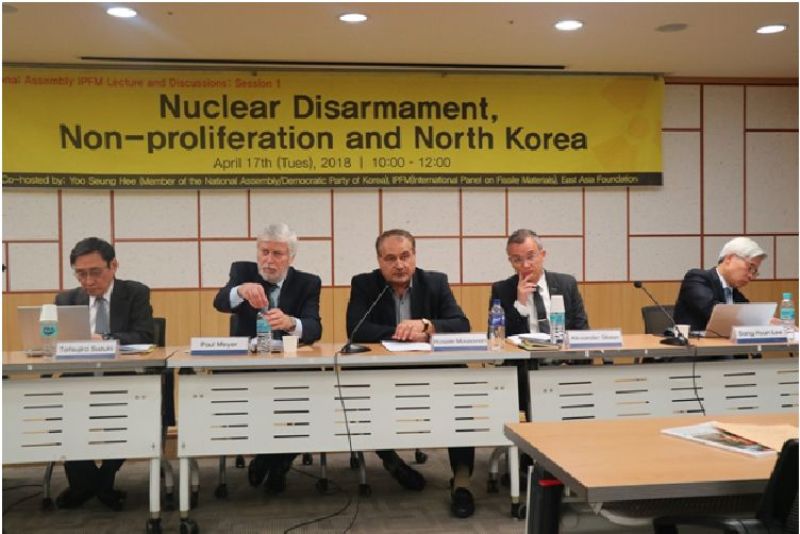
Hossein Mousavian put forward the suggestion through a speech that was delivered at the International Panel on Fissile Materials (IPFM), hosted by National Assembly of Republic of Korea on April 14-17 in Seoul.
During the recent weeks, there have been reports of contacts between some North Korean senior officials with Washington. President Donald Trump Tuesday confirmed direct contacts between the United States and North Korea.
In the speech, Mousavian proposed using Iran's nuclear agreement, known as the Joint Comprehensive Plan of Action (JCPOA), as a model for any future negotiation with North Korea.
Under the deal, Iran agreed to curb its nuclear program in exchange for the economic sanctions relief.
The full text of Mousavian's speech is as follows:
In July 2015, after 20 months of negotiations, Iran and six global powers, the EU3 +3 (France, Germany and the UK plus China, Russia and the United States) agreed on a Joint Comprehensive Plan of Action (JCPOA) to resolve the Iranian nuclear crisis. The deal provided verifiable assurances that, even if Iran broke out of the agreement, it would take at least a year for it to produce enough fissile material for a nuclear weapon. It is verified by the highest standards on nuclear transparency and inspections ever negotiated. In exchange, the USو, other world powers and United Nations committed to lift their nuclear-related sanctions on Iran. The agreement was welcomed by the international community and endorsed by a UN Security Council resolution.
The JCPOA was a win for the EU3+3 because it included robust monitoring, verification, and inspection of Iran’s nuclear program while increasing Iran’s breakout time to about a year. At the same time, it was a win for Iran because all unilateral and multilateral nuclear sanctions were lifted, Iran’s right to enrichment and heavy water production were respected, the international community would cooperate with Iran on peaceful nuclear technologies, and Iran’s foreign relations would be dramatically improved.
The following are the seven primary principles that led to the JCPOA that could be emulated in US-North Korea negotiations:
1. A belief in diplomacy over war and sanctions. The perception that increasing pressure will result in the capitulation of the opposing side did not hold true for Iran nor will it for North Korea.
2. Negotiations should be serious and have the aim of reaching a result based on mutual compromise. At the onset of the Iran nuclear negotiations, in 2013, both sides made clear their desired end state for the negotiations: for Iran, the removal of nuclear sanctions and respect for its right to uranium enrichment and the nuclear fuel cycle; for the US and the other world powers that Iran does not build nuclear weapons.
Diplomats and leaders on each side also demonstrably displayed their commitment to make the negotiations a success. This was exemplified in the final round of negotiations, which saw U.S. Secretary of State John Kerry negotiating in Vienna with his counterpart Javad Zarif for 18 days straight—the longest consecutive stretch American diplomats had spent negotiating on foreign soil since the 1919 Versailles conference after World War I.
3. Dropping maximalist demands and seeking face-saving solutions. Any deal will have to be politically defensible for each side back home. Both sides must be able to sell it domestically as a win.
4. A comprehensive diplomatic solution that is implemented in step-by-step, reciprocal fashion by all sides. One reason the JCPOA is faltering today is because the Trump White House has not abided by this principle. Iran implemented most of its concessions in the first stage of the JCPOA’s implementation: reducing its stockpile of low-enriched uranium, cutting the number of its centrifuges, and implementing the Additional Protocol to its IAEA safeguards agreement. Iran then had to wait for the other side to abide by its commitment for economic cooperation, which has been dwindling by the day under the Trump administration. In order to reach a long term agreement such as the JCPOA with North Korea that is not threatened in its first years, the reciprocal actions under a deal must be carefully coordinated and implemented in a phased, step-by-step fashion.
5. For North Korea, any deal must be designed based on complete distrust in the United States, especially since the JCPOA experience has shown that, due to changes in political leadership or policy, the United States cannot be trusted to follow through on its obligations in a nuclear agreement.
6. Negotiations must be multilateral. The negotiations leading to the JCPOA involved all five permanent members of the UN Security Council as well as Germany. While bilateral North Korea-US negotiations are vital, South Korea, Japan and the other concerned powers must also be present. Any agreement between just the United States and North Korea would be less sustainable.
7. The UN Security Council must endorse any final agreement. A deal backed by the UN Security Council will bolster the confidence of all parties, especially North Korea, that the other side will implement its commitments.
9156**1771
Follow us on Twitter @IrnaEnglish
 solhkhabar | Peace International News Agency Peace International News Agency , Peace News , International Agency News of Peace
solhkhabar | Peace International News Agency Peace International News Agency , Peace News , International Agency News of Peace